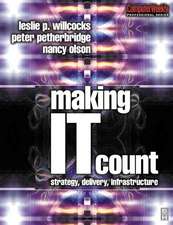Empirical Development Economics
Autor Måns Söderbom, Francis Teal, Markus Eberhardt, Simon Quinn, Andrew Zeitlinen Limba Engleză Paperback – 7 oct 2014
Empirical Development Economics has been designed as a hands-on teaching tool to investigate the causes of poverty. The book begins by introducing the quantitative approach to development economics. Each section uses data to illustrate key policy issues. Part One focuses on the basics of understanding the role of education, technology and institutions in determining why incomes differ so much across individuals and countries. In Part Two, the focus is on techniques to address a number of topics in development, including how firms invest, how households decide how much to spend on their children’s education, whether microcredit helps the poor, whether food aid works, who gets private schooling and whether property rights enhance investment.
A distinctive feature of the book is its presentation of a range of approaches to studying development questions. Development economics has undergone a major change in focus over the last decade with the rise of experimental methods to address development issues; this book shows how these methods relate to more traditional ones.
Please visit the book's website at www.empiricalde.com for online supplements including Stata files and solutions to the exercises.
| Toate formatele și edițiile | Preț | Express |
|---|---|---|
| Paperback (1) | 580.07 lei 6-8 săpt. | |
| Taylor & Francis – 7 oct 2014 | 580.07 lei 6-8 săpt. | |
| Hardback (1) | 1346.37 lei 6-8 săpt. | |
| Taylor & Francis – 31 oct 2014 | 1346.37 lei 6-8 săpt. |
Preț: 580.07 lei
Preț vechi: 682.44 lei
-15% Nou
Puncte Express: 870
Preț estimativ în valută:
110.100€ • 115.66$ • 91.90£
110.100€ • 115.66$ • 91.90£
Carte tipărită la comandă
Livrare economică 03-17 aprilie
Preluare comenzi: 021 569.72.76
Specificații
ISBN-13: 9780415810494
ISBN-10: 0415810493
Pagini: 462
Ilustrații: 51 black & white illustrations, 108 black & white tables, 51 black & white line drawings
Dimensiuni: 174 x 246 x 24 mm
Greutate: 0.78 kg
Ediția:New.
Editura: Taylor & Francis
Colecția Routledge
Locul publicării:Oxford, United Kingdom
ISBN-10: 0415810493
Pagini: 462
Ilustrații: 51 black & white illustrations, 108 black & white tables, 51 black & white line drawings
Dimensiuni: 174 x 246 x 24 mm
Greutate: 0.78 kg
Ediția:New.
Editura: Taylor & Francis
Colecția Routledge
Locul publicării:Oxford, United Kingdom
Public țintă
Postgraduate and UndergraduateCuprins
I. Linking Models to Data for Development 1. An Introduction to Empirical Development Economics 2. The Linear Regression Model and the OLS Estimator 3. Using and Extending the Simple Regression Model 4. The Distribution of the OLS Estimators and Hypothesis Testing 5. The Determinants of Earnings and Productivity 6. Modelling Growth with Time Series Data 7. The Implications of Variables Having a Unit Root 8. Exogenous and Endogenous Growth 9. Panel Data: An Introduction 10. Panel Estimators: POLS, RE, FE, FD 11. Instrumental Variables and Endogeneity 12. The Progamme Evaluation Approach to Development Policy 13. Models, Experiments and Calibration in Development Policy Analysis II. Modeling Development 14. Measurement, Models and Methods for Understanding Poverty 15. Maximum Likelihood Estimation 16. Modeling Choice: The LPM, Probit and Logit Models 17. Using Logit and Probit Models for Unemployment and School Choice 18. Corner Solutions: Modeling Investing in Children and by Firms 19. An introduction to structural modelling in development economics 20. Structural methods and the return to education 21. Sample Selection: Modeling incomes where occupation is chosen 22. Programme Evaluation: Regression Discontinuity and Matching 23. Heterogeneity, Selection, and the Marginal Treatment Effect (MTE) 24. Estimation of Dynamic Effects with Panel Data 25. Modeling the Effects of Aid and the Determinants of Growth 26. Understanding Technology Using Long Panels 27. Cross-section Dependence and Nonstationary Data 28. Macro Production Functions for Manufacturing and Agriculture 29. How can the processes of development best be understood?
Descriere
Understanding why so many people across the world are so poor is one of the central intellectual challenges of our time. What explains a pattern of extreme destitution for billions combined with plutocratic levels of income for a tiny minority? This book offers a novel approach to addressing these areas by providing the tools and data that will enable students, researchers and professionals to investigate these issues.

















